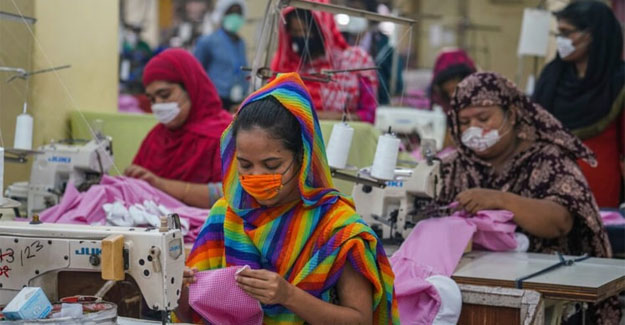
Strengthening Garment Industry Vital For LDC Graduation: Report
LDC graduation presents an opportunity for the countries to position their textile and clothing sector higher up the global value chain. Asian countries graduating from the category of least developed countries (LDCs) need to take measures to bolster their textile and clothing sector, according to a report prepared by the World Trade Organization (WTO) and three UN bodies. The report titled "The Textile and Clothing Sector in Asian Graduating Least Developed Countries: Challenges and Ways Forward," focuses on countries such as Bangladesh, Laos and Nepal, where the textile and clothing sector is a major industry and will be significantly impacted by LDC graduation. Combined textile and clothing exports from LDCs in Asia account for 8% of the global total, which contracted in 2020 due to the pandemic. The sector is an important source of employment, especially for women. LDC graduation offers opportunity The report notes that the LDC graduation presents an opportunity to move higher up the global value chain. Manufacturers consulted for the report said they expected graduation to impact their export performance. In addition to facing higher tariffs, most garment manufacturers rely heavily on imported textiles and will struggle to meet more restrictive rules of origin criteria after graduation. Many said they do not have a response plan yet for LDC graduation and are focusing on addressing the impact of the pandemic. How graduation will affect sourcing Many major clothing brands and retailers consulted for the report believe that LDC graduation will only modestly affect their sourcing and are planning to expand sourcing from graduating LDCs over the next three to five years. Workplace safety, working conditions, environmental compliance, innovation and speed to market are increasingly becoming major factors for brands in their long-term sourcing. "We have consulted many brands and retailers on their future sourcing plans and how it affects graduating LDCs. What we have found is that major buyers are consolidating their sourcing portfolio and, increasingly, they are seeking to source from larger, often multinational apparel manufacturers," said Matthias Knappe, programme manager of Fibres, Textiles And Clothing at the International Trade Centre (ITC). "This poses a challenge to many apparel-producing SMEs in LDCs. Together with our partners, we hope to provide support for these small businesses, boost their competitiveness, and overcome this challenge," he said. The report was produced by the WTO, the UN Department of Economic and Social Affairs, ITC and UNCTAD, bringing together different areas of expertise on LDC graduation and the textile and clothing sector. Bangladesh – A Case Study The study notes the lack of export diversification among the Bangladesh RMG exporting units and limited market reach.
- More than one-third of the firms ship to 3-5 countries only, while another 16% export to 6-10 countries
- Export markets for woven manufacturers was relatively more diversified than for knitwear.
- Several firms reported that they were effectively exploring new market opportunities amongst others – in Brazil, China, India and South Africa.
- The US is considered the second preferred country in terms of marketing more products, followed by Japan, Russia, UK, Canada and Korea.
- Several exporters produce complex items, which require automated technology, and versatile worker skills.
- One firm reported producing high-value denim items which uses low ounce stretch, sea plastic recycled fabrics, regenerated cotton fabrics, jute blended fabrics and Tencel fibres, explaining its niche market advantages.
- 40% of woven manufacturing firms believe their products are difficult to produce by other firms and countries.
- 85% of sample firms have plans for upgrading products and processes, upgrading technology and worker skills.
- Firms are adopting energy saving and GHG emission reduction technologies, software-based production tracing, digitalising administrative and other operations.
- Many reported producing and marketing their own designs alongwith supplying the regular import orders.
- One firm reported producing a complete pair of denim trousers in 17 minutes, aiming to bring it down to 14 minutes, at par with global efficiency standards.
- Many are of the view that as a bulk producer, Bangladesh has tremendous depth and competitiveness strength.
- They also believe that buyers probably drive hard bargains in Bangladesh due to the preferential tariffs.
- Moreover, business is already improving due to the US-China trade war.
- Technology upgradation could happen at the cost of employment generation.
- Seamless infrastructure is of course, much needed, to reduce cost of doing business.
- Exporters could benefit from extended transition period for graduating LDCs, securing preferential trade deals.
Textile Excellence
If you wish to Subscribe to Textile Excellence Print Edition, kindly fill in the below form and we shall get back to you with details.













